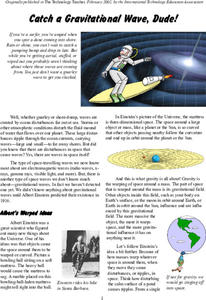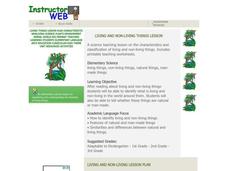Purdue University
Recycling Paper
Build an appreciation for the green movement by recycling your own paper! Learners participate in a STEM instructional activity by learning about the process of recycling paper and then designing their own models. Their ultimate task is...
NOAA
Are You Climate Literate?: Play the Essential Principles Challenge
Installment eight of the 10-part Discover Your Changing World series tests the class's understanding of climate. Scholars play alone or in small groups to assess their understanding of climate systems, causes of climate change, and...
Purdue University
Eco-llapse
A balanced ecosystem doesn't mean balanced populations. Budding scientists complete a series of activities to learn about the relationship between producers and consumers in an ecosystem. They complete the wildlife conservation...
Aquarium of the Pacific
Kelp Forest Conservation
There otter be a better way. As a class, groups work together to create a food web based on the organisms in the kelp forest. Budding scientists watch a video on the kelp forest to see how the organisms create a food web and hear about...
American Museum of Natural History
Journey to Deep Sea Vents
Take a deep dive into oceanography. The online interactive allows for learners to board a submersible to dive to the bottom of the ocean to investigate sea vents. On the way down, individuals see different marine life at different...
NASA
Catch a Gravitational Wave, Dude!
It is cowabunga time! Pupils read an article about the NASA LISA mission on gravitational waves and conduct additional research on them. The class participates in a science bowl type competition about gravitational waves. Panels of four...
Minnesota Department of Natural Resoures
Minnesota’s Forests
The forests of Minnesota provide middle schoolers with an integrated learning opportunity. They examine the three biomes and their histories, conduct experiments, read stories, and draw pictures. A lovely lesson about trees.
Children’s Hospital of Philadelphia
Meet the Germs
A lesson introduces scholars to the scientist, Martinus Beijerinck, the person behind virus discovery. Learners research and complete a graphic organizer that showcases the differences between a virus and bacteria. Small groups share...
Children’s Hospital of Philadelphia
Organs and Tissues of the Immune System
It's virus-fighting time! Pupils learn how viruses attack and reproduce and how the immune system works to protect the body. They identify unfamiliar terms and tissues and organs of the immune system. Working in small groups, scholars...
Serendip
Using Models to Understand Cellular Respiration
Energize biologists with colorful images in an activity that captivates the imagination while demystifying the subject of cellular respiration. Participants build comprehension skills and access core content knowledge by analyzing text...
American Chemical Society
Atoms Can Be Rearranged to Make Different Molecules
Uncover the building blocks of the universe as budding chemists explore atoms and molecules in an exciting inquiry-based activity. Investigators view an interactive video describing the chemical structure of six molecules. Using...
PBS
Curious George: Five Senses
Curious scholars make like Curious George and use their five senses to identify mystery objects. After a brief discussion, learners watch an engaging Curious George video in preparation for an activity. Scholars visit three tables that...
Personal Genetics Education Project
How Does Ancestry Testing Work? Exploring Admixture Testing
Find out the science behind ancestry testing! Investigators watch a video exploring how ancestry works before participating in a hands-on group activity. Scholars role play scientists while learning about testing protocols and test...
Curated OER
Living And Non-living Things
Learners identify what is living and non-living in the world around them. They also tell whether these things are natural or man-made
Curated OER
Rock, Paper, Scissors
Students explore the concept of dominant and recessive genes by examining the dominant and recessive characteristics of a game of rock, paper, scissors. In small groups students play the game and explain how one move is dominant over...
Curated OER
Do the Hokey Pokey in Many Languages
Students replace the body part words in the tune The Hokey Pokey with the same body part words in other languages. They learn the vocabulary more readily because of the connection to music.
Curated OER
My Habitat Address
Sixth graders draw a habitat and write about what they would need to survive in the habitat. They define the input of items such as materials, energy, and information, and what goes out of the habitat. They play a "Habitat Address" game,...
Curated OER
Maintaining Strong Fisheries
Pupils play a game about the life cycle of a blue crab in order to witness the causes of changes in the crab population and discuss what a resource manager could do to keep a stable crab population. Students then create a game titled...
Curated OER
Honu Survivor The Green Sea Turtle Experience
Discuss prior knowledge of the green sea turtle. Students play a game where they are divided into two teams, predators and baby turtles. They receive "name" tags to tell which animal they are. The goal of the baby turtle is to get to the...
Curated OER
Predator-Prey Relationships
Students explore the interrelatedness of predators and prey in four different activities. They simulate an aquatic insect, fish, and osprey food chain during a poker chip game, play an M&M game to simulate the relationship between...
Curated OER
Science: About Your Body
First graders examine body systems and demonstrate their competency in a quiz game show. Lessons cover the brain, heart, lungs, digestive system, muscles, and bones. Students , in teams, answer teacher-created questions in the game.
Curated OER
Fish, Fish: Teaching K Students About Things That Live in the Sea
Students participate in activities designed to help them connect the words to the animals they are studying. Octopus is reinforced through playing a game, "Octopus Tag." Students play a cooperation game of passing bean bags from student...
Curated OER
Life Science: Exploring Our Human Bodies
Students explore the concept of the human body. They complete a variety of activities concerning the function of various organs. They listen to their heartbeat with a stethoscope, examine how muscles work during a game of tag, and play...
Curated OER
O of for Owl
In this owl puzzles worksheet, students solve an owl word scramble, an owl word search, an owl word game, and an owl identification game.
Other popular searches
- Word Games
- Vocabulary Games
- Reading Fluency Games
- Math Games
- Algebra Games
- Reading Comprehension Games
- Probability Games With Dice
- Physical Education Games
- Grammar Games
- Drama Games for Kids
- Spelling Games
- Rhyming Word Games

























